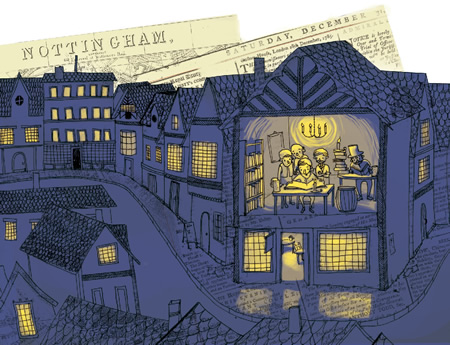The following is a Chair’s Blog written for the Nottingham Writers’ Studio
When it comes to naming a room at the Nottingham Writers’ Studio after a local literary figure we’re absolutely spoilt for choice. But as 2014 is the Year of Reading Women we’ve decided to name our Board Room after Susannah Wright, an incredible woman. But more of this fiery individual in a bit…
The Year of Reading Women was set up after alarming figures from Vida, the American organisation for women in the literary arts, found a huge imbalance in how male and female writers – and reviewers – are treated. Here’s a couple of startling facts for you. In 2012 16% of reviewers in The New York Review of Books were women, with only 22% of the books reviewed written by women. Things aren’t much better here in the UK. An investigation by the Guardian in March 2013 found that 8.7% of books reviewed in the London Review of Books were by women with the Guardian offering a more respectable 34.1%.
I’m proud that at the Writers’ Studio we are bucking these trends. Our Development Director, and beating heart, is Pippa Hennessy and on the Board itself women outnumber men by a ratio of 5:2. The emergence of the Studio itself was thanks to the likes of Nicola Monaghan teaming up with our patron, Jon McGregor. And of course our first ever coordinator was Aly Stoneman, who is now on the Board.
Susannah Wright was born in Nottingham in 1792 as Sarah Godber. Like many others in the city during this period she became a lace mender and embroiderer. She left her hometown in 1815 when she moved to London (some things don’t change) where she got married and met radical bookshop owners Jane and Richard Carlilie. But she returned back to Nottingham (some things don’t change) and in 1826 opened up an atheist and freethought bookshop. It was here that she reprinted some writings by Richard Carlile who, along with his wife and sister, were already in jail for printing seditious and blasphemous publications.
During this period Nottingham had a rapidly growing population as well as very restricted boundaries. You could walk around the town boundary in just under 40 minutes, with 50,000 people living in a tightly compressed area of what we would call the Lace Market, Hockley and west of St. Marys down to the Market Square. There were three main occupations that accounted for the majority of work: the lace trade, framework knitting and shoemaking, each of which had rudimentary trade union organisations. This meant that news spread fast and the city was becoming increasingly politicised to the extent that we burned down our castle in 1831 during the Reform Riots. Susannah Wright was pivotal in giving voice to the newly educated working classes by providing access to ideas and culture that for far too long had been defined from above rather than below as well as providing a platform for women to express their radicalism.
Although there were hundreds who went to jail for either printing, publishing or distributing books that were considered blasphemous or salacious, Susannah Wright was unique in being the only woman who has been sent to prison on this charge. Her crime? Daring to expose the links between religion and state. She was arrested for selling salacious literature to an agent of The Society for the Suppression of Vice. Wright chose to defend herself and invoked the wrath of the judge for her refusal to be quiet in court. This only served to rile her sense of injustice, pointing out to the Judge, ‘You, Sir, are paid to hear me’.
She was pregnant at the time and was sent to Newgate Jail where she gave birth in horrendous conditions. On returning to court for sentencing on 22 July 1822 she still refused to accept the charges of ‘bringing the Christian religion into disbelief and contempt among the people’ arguing her conviction was invalid as Christianity had no place in the law. She was sentenced to 18 months in jail at Cold Bath Prison in Clerkenwell. When she was released from prison she returned to Nottingham and set up a bookshop on Goosegate that continued the fight of the working classes, identity politics and various paths to self-empowerment.
If 2014 is the Year of Reading Women then it seems fitting to recognise the work of a woman who started a very different fight: the right to read what you choose and as a woman, the right to be heard. We have seen this battle continue in the work of Alan Sillitoe who represented working class voices on their own terms and moved away from the sensibilities of middle class literature as well as D H Lawrence who, through the acquittal of Penguin Books in the Lady Chatterley Trial of 1960, made it possible for greater freedom of expression. As important as their contribution to literature has been, their path had been paved a century or so earlier by a defiant woman who simply refused to be silenced.
I would like to thank Christopher Richardson, author of City of Light, for it was reading his fantastic book on the history of Chartism and Atheism in Nottingham that made me first aware of Susannah Wright.


